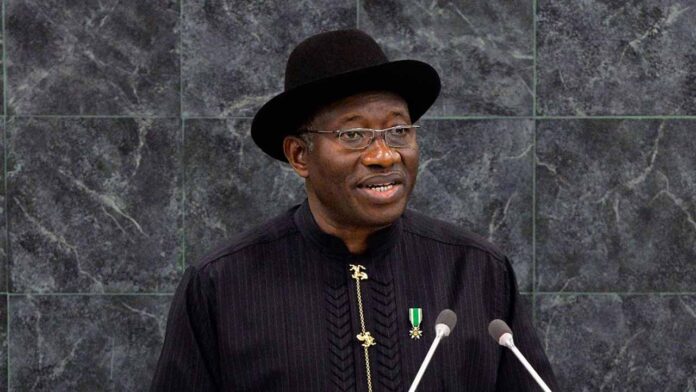Anchor: Goodluck Ebele Jonathan is on the hot seat of the presidential edition of Who Wants To Be A Millionaire. He has used up all his lifelines of 50-50, Ask the Audience and Phone a Friend. But he’s one question away from winning the $30m star prize.
(Applause from audience)
GEJ: Thank you. Thank you.
Anchor: You have done very well so far. You scaled the tough questions on fuel subsidy, Boko Haram, and Diezani Alison-Madueke. As well as the ones on APC, Rotimi Amaechi, Bola Tinubu, and the national conference. Are you ready for the ultimate question?
GEJ: Ever ready!
Anchor: Who is the most criticized president in the world?
GEJ: It’s me! It’s me!
Anchor: Sir, let’s reel out the options first…
GEJ: (cuts in) Don’t bother yourself. It’s me!
Anchor: (Smiling) A) Andrew Johnson. B) Idi Amin. C) Saddam Hussein. D) Goodluck Jonathan.
GEJ: D! DDDDDDDDD…
Anchor: Is that your definitive answer?
GEJ: It’s. It’s D, Goodluck Ebele Azikiwe Jonathan!
Anchor: If you had picked C, Saddam Hussein, you would have been…wrong! If you had chosen B, Idi Amin, you would have gone home with $15m less…
GEJ: (cuts in) It’s D. Just write the cheque!
Anchor: Then, sir, you got it wrong. Because the answer is A, Andrew Johnson – the 17th President of the United States of America!
We present Goodluck Ebele Jonathan’s biography.
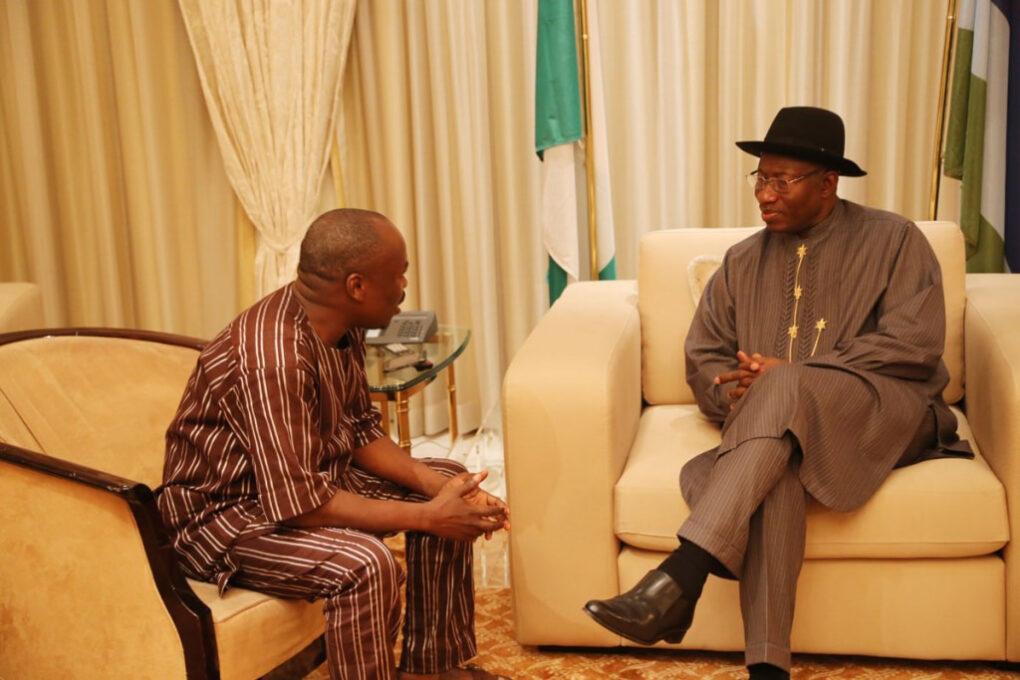
Goodluck Ebele Jonathan: Birth
Goodluck Ebele Azikiwe Jonathan was born on November 20th, 1957, in Otuoke, Ogbia Local Government Area of Bayelsa State. His father, Lawrence Ebele Jonathan, was a canoe maker, and his mother, Eunice Ayi Ebele Jonathan, was a retired farmer.
They must have been card-carrying members of the National Council of Nigeria and the Cameroons (NCNC). Or a fan of the premier of Eastern Region, Nnamdi Benjamin Azikiwe, to have named their son after the frontline politician.
Neither is true!
“My grandmother named me Azikiwe,” Jonathan once said.
“She probably had no inkling of the meaning of the name. Other than she was enamoured with the achievements of the nationalist, the Great Zik of Africa.”
The name symbolizes peace, understanding, greatness, and solidarity in unity. The meaning stems from anger and war between two kindreds (say, Jonathan and Muhammadu Buhari).
But both recognize (well, maybe one) the need for peace to reign (post-2015 presidential election). For the sake of their children (Nigerians) and generations to come (future Nigerians).
You can ignore the things in the brackets!
MUST READ:
- Bola Tinubu Biography: Net Worth, Political Career, Controversies, and More
- Dino Melaye Biography: Net worth, Private Jet, and Scandals
Goodluck Ebele Jonathan: Education
The Ijaw indigene attended two primary schools – St. Stephens’s in Otuoke and St. Michael’s in Oloibiri. And Mater Dei High School, Imiringi.
He holds a Bachelor of Science degree in Zoology with Second Class Honours, Upper Division. A Master of Science degree in Hydrobiology/Fisheries biology. And a Doctor of Philosophy in Zoology, all from the University of Port Harcourt, Rivers State.
Jonathan started his working career as an education inspector in the state’s ministry. He later joined the Rivers State College of Education as an academic staff.
Before joining Nigeria politics in 1998 as a member of the Peoples Democratic Party (PDP), he worked as an environmental protection officer. And as an assistant director at the Oil Mineral Producing Areas Development Commission.
Goodluck Ebele Jonathan: Career
Jonathan contested and won the gubernatorial election with PDP flag bearer Diepreye Alamieyeseigha. He was sworn in as the deputy governor of Bayelsa State on May 29, 1999.
A twist in the political tale in the state led to the impeachment of Alamieyeseigha as the governor. He was charged with money laundering in the United Kingdom. Jonathan was sworn in as the state governor on December 9, 2005. A position he held on to till May 28, 2007.

He served as vice president of Nigeria from 2007 to 2010 under the administration of Umaru Musa Yar’Adua, a former governor of Katsina State.
As the VP, he took part in cabinet meetings and, by statute, was a member of the Federal Executive Council, National Security Council, and the National Defence Council. He was the chairperson of the National Economic Council.
Jonathan’s key contribution was helping to negotiate an agreement with the many militant groups that dotted the nooks and crannies of the Niger Delta. They were encouraged to drop their arms and embrace the government’s amnesty programme.
On February 9th 2010, Jonathan was named as Acting President. The Senate triggered the controversial doctrine of necessity after Yar’Adua overstayed his medical treatment in Saudi Arabia. Jonathan’s first day as acting president saw him do a minor cabinet reshuffle. Michael Aondoakaa was the first casualty.
Following the announcement of the death of Yar’Adua on May 5th 2010, and in line with the order of succession in the Nigerian constitution, Jonathan was sworn in as the substantive president of the Federal Republic of Nigeria the next day.
On May 18th 2010, the National Assembly approved Jonathan’s nomination of Namadi Sambo, the governor of Kaduna State, as his replacement as vice president. The duo was on PDP’s ticket for the general election in 2011.
On May 29th 2011, Jonathan was sworn in as the president and the commander-in-chief of the armed forces of Nigeria. He was Nigeria’s 14th head of state.
In his inaugural speech, Jonathan said his government would focus on a Transformation Agenda. While it will continue to implement the seven-point agenda policy framework of his predecessor, whom he took over from in “very sad and unusual circumstances”.
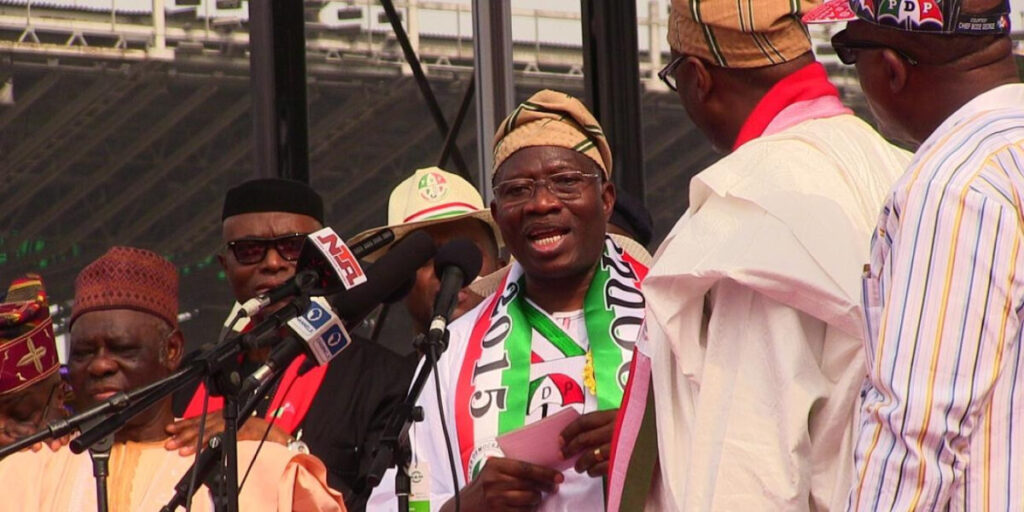
Jonathan lost his presidential re-election bid to the former military head of state General Muhammadu Buhari of the All Progressives Congress in 2015.
“I don’t think Nigerians will make the mistake of voting for Buhari,” he said before the election.
“Gen. Buhari, with due respect, is not the right option for Nigeria. It is a gamble that is not worth taking. I may not be perfect, as nobody is perfect. But I believe that come Saturday. Most Nigerian voters will choose me as the best candidate to lead the nation forward.”
On March 31st 2015, Jonathan conceded the election to Buhari. And like a true Azikiwe, he became the first incumbent president in the country’s history to do so.
“Nobody’s ambition is worth the blood of any Nigerian,” he said.
SEE: Olusegun Obasanjo Biography: Military/Political Career, Net worth, Polygamy
Goodluck Ebele Jonathan’s Presidency: Key Issues and Events
Here are some of the key events and issues under the administration of Jonathan.
Nigeria rebased its gross domestic product in over a decade. Becoming the largest economy in Africa, ahead of South Africa and Egypt.
While in office, his government accrued over US$454 billion from oil revenue.
The construction of new railways in Nigeria, including the Abuja-Kaduna railway and Lagos-Ibadan railway. And conceptualised high-speed rail projects took place under him.
Many federal roads in the country, including the Abuja-Lokoja expressway, Enugu-Abakaliki expressway, Lagos-Benin expressway, Onitsha-Owerri highway and most parts of the Enugu-Port Harcourt expressway, were constructed or beautified.
Started the construction of the second Niger Bridge that connects Onitsha and Asaba to reduce the weight on the old Niger Bridge that has been functioning since December 1965.
An upgrade of the Akanu Ibiam Airport in Enugu into an international airport. It now directly connects the South-East region of Nigeria to the outside world. It was the first since Nigeria’s independence in 1960.
On August 2nd 2010, Jonathan launched the ‘Roadmap for Power Sector Reform’, an initiative to achieve a stable electricity supply in the country. The Power Holding Company of Nigeria (PHCN) was split into 15 private bidding companies.
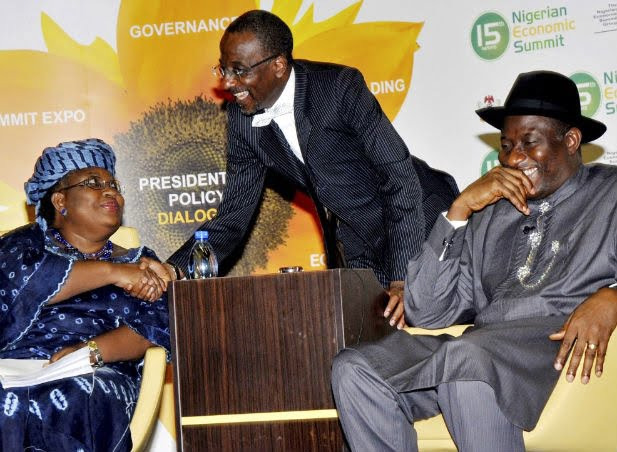
On February 20th 2014, Jonathan suspended Sanusi Lamido Sanusi as governor of the Central Bank of Nigeria. Sanusi had revealed the extent of financial recklessness and diversion of public funds under Jonathan.
The Minister of Petroleum, Diezani Alison-Madueke, was said to have diverted $6 billion (₦1.2 trillion) from the treasury. Jonathan was alleged to have ordered over ₦3trillion from the Central Bank of Nigeria to support his election under the guise of an intervention fund for national security.
Charles Soludo, a former governor of the CBN, even likened Jonathan’s financial recklessness to that of former Ugandan president Idi Amin. And in a lecture at George Washington University, Ngozi Okonjo-Iweala, a former minister under Jonathan, said his administration was the primary cause of Nigeria’s economic woes.
The scandal on September 5th 2014, involving the seized but undisclosed and undeclared $9.3m stuffed in three suitcases, raised some eyebrows. The cash, which was carried in a private jet, was discovered by customs officers at Lanseria airport, South Africa.
Jonathan’s government later explained that the money was meant for the purchase of arms in the fight against terrorism. However, the private jet was found to belong to Pastor Ayo Oritsejafor, the president of the Christian Association of Nigeria (CAN).
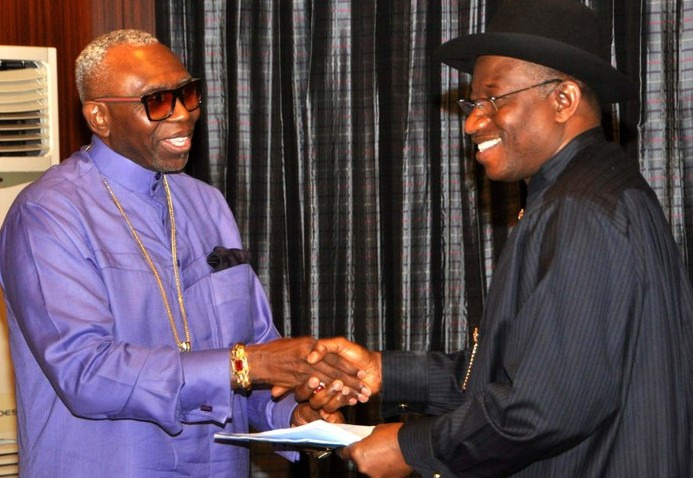
Though none of the corruption allegations against Jonathan has been proven in any law court, his government has largely been described as corrupt.
On January 1st 2012, his administration announced the plan to end fuel subsidies. Some prominent Nigerians spoke with one mind, and it was against the removal of the subsidy. General Muhammadu Buhari said the government should not remove the fuel subsidy but tackle corruption.
Two former military heads of state, Yakubu Gowon and Ibrahim Babangida, shared similar views. Gowon said the country’s infrastructure should be revived before fuel subsidy removal, while Babangida said the action was ill-timed.
After five days of national protests and strike actions, Jonathan announced on January 16th that the pump price of petroleum would be N97 per litre compared to a post-subsidy level of N147 naira.
In 2012, a Subsidy Reinvestment and Empowerment Program (SURE-P) was instituted. The money saved from partial petrol price deregulation would be spent on the country’s physical infrastructure, such as roads, bridges, etc.,.
Jonathan said that subsidy consumed too much of the country’s revenues in his book, My Transition Hours. He also recalled how Ngozi Okonjo Iweala had briefed him about the corrupt practices that were discovered by a technical committee she headed.
In March 2014, Jonathan inaugurated a National Conference. It had 492 delegates that debated on key socio-political national issues impeding national development. It was the first of its kind since the political reform conference in 2005.
On July 20th 2014, Patrick Sawyer, a Liberian-American, flew from Monrovia to Lagos. He was said to be “terribly ill” when he left Monrovia. His condition got worse upon arriving at the airport in Lagos. He died five days later.
The doctor who treated Sawyer, Ameyo Adadevoh, subsequently died of Ebola. And that was the outset of the Ebola virus in Nigeria.
In January 2014, Jonathan signed the Same-s3x Marriage Prohibition Act into law. It prohibits gay relationships, marriages, membership, and other involvement in gay societies and organisations.
Penalties could be up to 14 years in prison for gay marriages and up to 10 years for other violations of the law. The bill was mooted after an international poll showed that 98 per cent of Nigerians frowned at homos3xuality – the highest percentage of any country polled.
Whether in the north or south, Nigerians panicked as the fear of the Boko Haram sect spread like a contagion. From the first major challenge on the October 2010 Independence Day bombing in Abuja to the kidnap of 276 school girls in Borno State in April 2014, Jonathan’s administration was heavily criticized for its failure to tackle insecurity.
The threat posed by Boko Haram drove up the country’s security budget. However, it became an avenue for corrupt practices.
SEE: Peter Obi Networth and Biography (Everything You Should Know)
Goodluck Jonathan: APC
It was alleged that the former president asked about standing for the 2023 presidential election under the All Progressives Congress. And that the party’s N100m nomination form for its primary had been picked up for him by his supporters.
It proved to be a ruse as the only name beginning with the letter J during the June 8th primary at Eagle Square in Abuja was Jack-Rich Tein!
Goodluck Jonathan: Post-presidency
Jonathan’s number one job since leaving office is defending his administration, which has sounded like a broken record. Aside from this, his hands are full of both local and international engagements.
In June 2019, he was named chairperson of the newly inaugurated International Summit Council for Peace. A year and a month later, Jonathan was appointed special envoy of the Economic Community of West African States (ECOWAS).
He led the mediation talks during the 2020 Malian protests. He’s the honorary special advisor to the Bayelsa Education Trust Fund board.
SEE: Prices of Lagos to Abuja by road in 2023
Goodluck Jonathan’s Wife
Jonathan is married to Dame Patience Faka Jonathan. She was born on October 25th 1957, in Port Harcourt, Rivers State. She’s a graduate of the University of Port Harcourt, where she read biology and psychology.
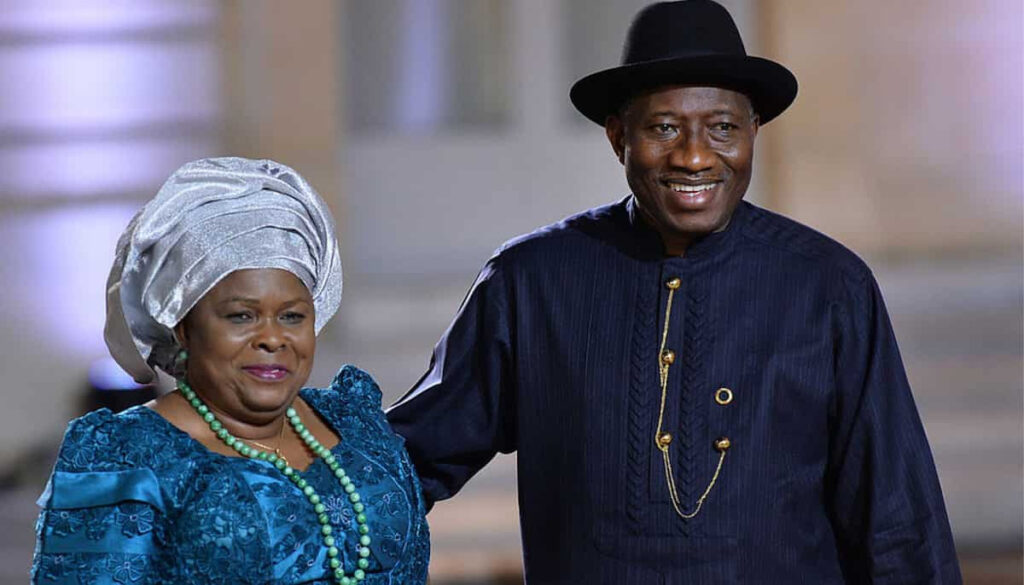
Goodluck Jonathan’s National honours
He has two major national honours. Grand Commander of the Order of the Federal Republic (GCFR) and Grand Commander of the Order of the Niger (GCON).
Goodluck Jonathan’s Children
Jonathan and Patience have two children, Ariwera (son) and Aruabai (daughter). Jonathan ‘looked back’ and took another woman, Lott Jonathan, as his wife. She’s a Law graduate from Rivers State University of Science and Technology. They have two sons.
Goodluck Jonathan’s Net worth
In 2007, he declared his assets worth ₦295,304,420, and that was before he became Nigeria’s commander-in-chief of the armed forces and other resources, including the CBN and NNPC. In October 2014, however, a United States-based publication, Richest Lifestyle, gave Jonathan’s worth to be $100 million (about N16.5 billion).
The presidency condemned the publication, describing it as another attempt to portray Jonathan as a corrupt leader.
“We have noted with consternation the listing of President Goodluck Jonathan by a website – RichestLifestyle.com – as the sixth richest African President with an estimated net worth of $100 Million U.S. Dollars,” a statement by a presidential spokesperson, Reuben Abati, read in parts.
“The Presidency condemns the totally unwarranted inclusion of President Jonathan in the publication titled “Africa’s Richest Presidents 2014” as another attempt to unjustifiably portray the President as a corrupt leader and incite public disaffection against him.
“We, therefore, demand a retraction and an unreserved apology from Richest Lifestyle.com and all those who have reproduced the offensive article. Otherwise, they should be prepared to substantiate their libellous claims against the president in courts of law within and outside Nigeria.”
SEE: Ayra Starr Biography: The Benin Connection, Age, Net worth, ‘Ija’
Goodluck Jonathan’s Cars
Jonathan has a fleet of luxury cars in his garage. Most of his cars are bulletproof to give extra protection to him and his family. Some of his cars are a Mercedes Benz S550, a Range Rover Sport, and a BMW I3.
Goodluck Jonathan’s Houses
He has houses in various parts of the country and abroad. The two prominent ones are in Abuja and his hometown in Bayelsa.
SEE: Judy Austin Biography: Age, Net Worth, Career, Husband
Conclusion
One thing that history will never forget about Goodluck Ebele Jonathan is that he was the president at a time Nigeria faced major unrest arising from insecurity.
Some analysts believe Jonathan remains a good man, one of the softest leaders since independence. But being soft is not needed in governance.



